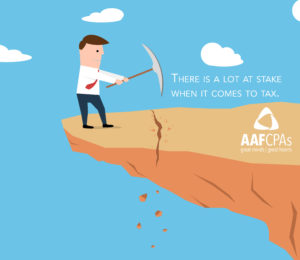Cautionary Tales: When year-round communication is left out of tax planning
 The pace of change in business is rapid, and as you know, executive leadership must be poised to quickly respond to challenges and seize opportunities as they arise. Often, decisions made throughout the year in response to challenges and opportunities have tax implications. In some cases, the tax benefits of these decisions have windows of opportunity that can close if held and only addressed at year-end. In other cases, tax consequences may be avoided or minimized with timely advice from tax council, and strategic planning. AAFCPAs has outlined notable examples of financial decisions made without proper guidance to serve as cautionary tales to businesses.
The pace of change in business is rapid, and as you know, executive leadership must be poised to quickly respond to challenges and seize opportunities as they arise. Often, decisions made throughout the year in response to challenges and opportunities have tax implications. In some cases, the tax benefits of these decisions have windows of opportunity that can close if held and only addressed at year-end. In other cases, tax consequences may be avoided or minimized with timely advice from tax council, and strategic planning. AAFCPAs has outlined notable examples of financial decisions made without proper guidance to serve as cautionary tales to businesses.
Aggressive debt payoff leaves taxpayer short on cash
A business taxpayer decided mid-year to pay off a significant loan in the millions of dollars. Unfortunately, he did not project for year-end taxes, and ended up owing more than anticipated. His aggressive loan payment schedule left him with no capital left to allocate to taxes. Using our expertise, AAFCPAs was able to successfully lower the tax exposure, but the taxpayer was still at the mercy of the IRS due to insufficient planning. Key takeaway: Before making significant decisions that affect cash flow, consult with your tax professional to analyze the potential impact of decisions on your company’s liquidity.
US taxpayer unaware of taxability of foreign investments
An individual taxpayer had a foreign bank account and assets housed in England. The taxpayer did not know this information needed to be reported annually to the US Government (i.e. FBAR). Unfortunately, once aware, the taxpayer was liable for late-payment penalties and interest in excess of $100,000. AAFCPAs helped the taxpayer manage through the situation and lower the fee, but the imposition of penalties could have been avoided entirely with proactive tax planning. Key takeaway: Ensure your tax advisor has a comprehensive understanding of your financial picture so you may efficiently plan for the upcoming tax season, and retain tax benefits to which you are entitled.
Exercising stock options leaves employee paying more than received
An individual taxpayer opted to exercise stock options received from an employer. However, doing so at that point in time triggered a tax liability in excess of the net cash benefit. Key takeaway: AAFCPAs advises taxpayers to consult with a tax professional in advance of financial decisions in order to evaluate timing, and cost/benefit.
Avoid Tax Pitfalls with Proactive Communication
In order to avoid potential tax pitfalls, AAFCPAs encourages clients to ask questions as often as they need, and engage in an ongoing dialogue with our tax professionals.
Brainstorm ideas with your AAFCPAs Tax Partner
In advance of any new initiative, going over your potential financial transactions together is wise. For example, as soon as you have an idea for a new product, service or capital investment, consult with your AAFCPAs tax professional. We will identify key considerations, and advise on potential downsides regarding new ventures. In addition, we may recommend optimal business structuring and interrelationships for asset protection, estate planning, as well as federal, state, and local tax minimization.
Maintain ongoing, and year-round communication
AAFCPAs schedules regular check-in meetings with clients, which leads to a more strategic, proactive planning process that positively impacts decision making and avoids pitfalls. The following are common questions we receive from clients who realize communication is key to a solid relationship with a tax-professional:
- How do I prepare for tax-triggering events?
- What filing requirements do I need to consider?
- What if I conduct business in a different state?
- When is the best time to exercise stock options?
There is a lot at stake when it comes to tax. At AAFCPAs, we help clients identify and prioritize their tax planning needs as they arise, ensure that clients are in compliance with all relevant tax regulations, and that they are preserving cash and maximizing stockholder value.
To learn more, contact Julie Chevalier CPA, Tax Partner, at jchevalier@nullaafcpa.com 774.512.4037

